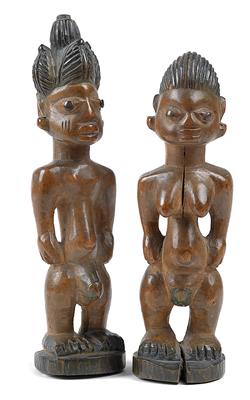Mixed lot (2 items), Yoruba, Nigeria: Pair of ‘Ibeji twin figures', female and male, style: Oyo.
Mixed lot (2 items), Yoruba, Nigeria: Pair of ‘Ibeji twin figures', female and male, style: Oyo.

Among the Yoruba people twins are regarded as something special. They have their own god, ‘Ere Ibeji’, are honoured in a separate cult and are considered to bring good fortune and blessing to their family. Another peculiarity is that twins are thought to share one and same soul! Should one of them die, a ‘vicarious figure’ of wood is carved for him (or her), in order to preserve the integrity of the mutual ‘twin soul’. These figures, called ‘Ibeji’, are placed on specific domestic altars and treated like living twins: they are washed, fed, cuddled, sung to and honoured. The present 'Ibeji-couple', male and female, displays a very beautiful, old shiny patina as a result of long care, decorative nails as pupils in the eyes, remains of dark colouring (as a result of ‘bluing’) in the characteristic hairstyle, on the genitals, as well as on the feet and base plate. Regional stylistic type: Oyo. With minor age damage (tears). Between about 1900 and the first third of the 20th century; H: 22 cm (m), 20 cm (w). (ME)
Provenance: Ladislas Segy, a famous, former art dealer and collector from New York, purchased it in 1951 (according to the document submitted by the consignor and attached to this item); American collection; Austrian private collection.
Literature.: 'Ibeji' by Georges Chemeche, ill. 88, 95 to 104.
Esperto: Prof. Erwin Melchardt
 Prof. Erwin Melchardt
Prof. Erwin Melchardt
+43-1-515 60-465
erwin.melchardt@dorotheum.at
24.03.2014 - 16:00
- Stima:
-
EUR 4.000,- a EUR 6.000,-
Mixed lot (2 items), Yoruba, Nigeria: Pair of ‘Ibeji twin figures', female and male, style: Oyo.
Among the Yoruba people twins are regarded as something special. They have their own god, ‘Ere Ibeji’, are honoured in a separate cult and are considered to bring good fortune and blessing to their family. Another peculiarity is that twins are thought to share one and same soul! Should one of them die, a ‘vicarious figure’ of wood is carved for him (or her), in order to preserve the integrity of the mutual ‘twin soul’. These figures, called ‘Ibeji’, are placed on specific domestic altars and treated like living twins: they are washed, fed, cuddled, sung to and honoured. The present 'Ibeji-couple', male and female, displays a very beautiful, old shiny patina as a result of long care, decorative nails as pupils in the eyes, remains of dark colouring (as a result of ‘bluing’) in the characteristic hairstyle, on the genitals, as well as on the feet and base plate. Regional stylistic type: Oyo. With minor age damage (tears). Between about 1900 and the first third of the 20th century; H: 22 cm (m), 20 cm (w). (ME)
Provenance: Ladislas Segy, a famous, former art dealer and collector from New York, purchased it in 1951 (according to the document submitted by the consignor and attached to this item); American collection; Austrian private collection.
Literature.: 'Ibeji' by Georges Chemeche, ill. 88, 95 to 104.
Esperto: Prof. Erwin Melchardt
 Prof. Erwin Melchardt
Prof. Erwin Melchardt
+43-1-515 60-465
erwin.melchardt@dorotheum.at
|
Hotline dell'acquirente
lun-ven: 10.00 - 17.00
kundendienst@dorotheum.at +43 1 515 60 200 |
| Asta: | Tribal Art |
| Tipo d'asta: | Asta in sala |
| Data: | 24.03.2014 - 16:00 |
| Luogo dell'asta: | Wien | Palais Dorotheum |
| Esposizione: | 18.03. - 24.03.2014 |
